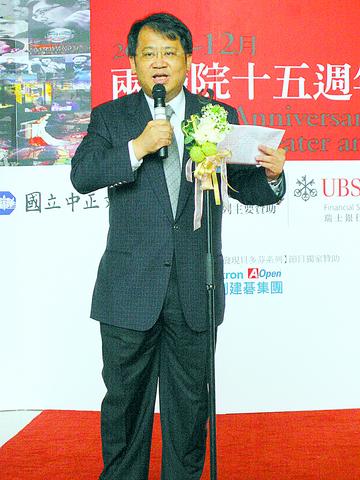On Oct. 31, the National Concert Hall and the National Theater will turn 15. At a press conference last Tuesday, Chiang Kai-shek Cultural Foundation director Ju Jung-ching
Ju, the director of Taiwan's most highly regarded percussion ensemble who took over management of the National Theater and Concert Hall last year, said that an important aim of the nation's premier performance venues was to bring down the entry barrier for the appreciation of the arts. "It is for this reason that we have brought in corporate sponsorship for some events," he said, pointing primarily to the Jose Cura and Kathleen Battle recitals in November, where premium seats will be available for only NT$2,500 and prices going as low as NT$400. The event is being sponsored by the Delta Foundation (
Saying that he did not want to upset proceedings, he gained vocal support from an audience that included many of Taiwan's top performers when he pointed out that the corporate support that the CKS Cultural Foundation was so loudly promoting was only going to high-profile classical music concerts, with absolutely nothing for drama. Although ticket sales for The Aurora Borealis (

PHOTO: IAN BARTHOLOMEW, TAIPEI TIMES
In line with lowering the entry barrier for people who might not generally be regular theater-goers, a number of big shows have been scheduled for outdoor spaces around the theater and concert hall. This will include a massive outdoor performance of ketsai opera by the Ming Hwa Yuan Taiwanese Opera Company (明華園). Chen Sheng-fu (陳勝福), the president of Ming Hwa Yuan, promised to draw 200,000 for a free outdoor concert scheduled for Oct. 31, in a display of bravado that is well backed up by the company's strong commercial record. Overall, for indoor performances, CKS public relations chief Liu Jia-yu (劉家渝) said that there were at total of 120,000 tickets to be sold for the three month season of 107 performances.
In addition to Jose Cura and Kathleen Battle, the other major imported acts include a visit by cello virtuoso Misoslav Rostropovich (Sept. 7), the first and third groups of the Nederlands Dans Theater (Oct. 11-13 and Oct. 25-27) and the Choir of Westminster Abbey (Oct. 27). High-profile local premiers include Smoke by the Cloud Gate Theater and in the minor league, the launch of the Zhu Lu-hao Traditional Chinese Theater Company (朱陸豪京劇團), in which famed comedian Sung Shao-ching (宋少卿) in what is being billed as "new Chinese comic opera" (Oct. 17-20) and She is Walking, She is Smiling, by Performance Workshop directed by Chin Shih-jie (金士傑). On the music front, the National Symphony Orchestra, under Chien Wen-bin, will perform the complete Beethoven symphonies and piano concerti in five concerts in September.
Tickets are already on sale, and for the major events are selling well. More information about events can be found on the Web at http://www.ntch.edu.tw.

Towering high above Taiwan’s capital city at 508 meters, Taipei 101 dominates the skyline. The earthquake-proof skyscraper of steel and glass has captured the imagination of professional rock climber Alex Honnold for more than a decade. Tomorrow morning, he will climb it in his signature free solo style — without ropes or protective equipment. And Netflix will broadcast it — live. The event’s announcement has drawn both excitement and trepidation, as well as some concerns over the ethical implications of attempting such a high-risk endeavor on live broadcast. Many have questioned Honnold’s desire to continues his free-solo climbs now that he’s a

As Taiwan’s second most populous city, Taichung looms large in the electoral map. Taiwanese political commentators describe it — along with neighboring Changhua County — as Taiwan’s “swing states” (搖擺州), which is a curious direct borrowing from American election terminology. In the early post-Martial Law era, Taichung was referred to as a “desert of democracy” because while the Democratic Progressive Party (DPP) was winning elections in the north and south, Taichung remained staunchly loyal to the Chinese Nationalist Party (KMT). That changed over time, but in both Changhua and Taichung, the DPP still suffers from a “one-term curse,” with the

Jan. 26 to Feb. 1 Nearly 90 years after it was last recorded, the Basay language was taught in a classroom for the first time in September last year. Over the following three months, students learned its sounds along with the customs and folktales of the Ketagalan people, who once spoke it across northern Taiwan. Although each Ketagalan settlement had its own language, Basay functioned as a common trade language. By the late 19th century, it had largely fallen out of daily use as speakers shifted to Hoklo (commonly known as Taiwanese), surviving only in fragments remembered by the elderly. In

Lines between cop and criminal get murky in Joe Carnahan’s The Rip, a crime thriller set across one foggy Miami night, starring Matt Damon and Ben Affleck. Damon and Affleck, of course, are so closely associated with Boston — most recently they produced the 2024 heist movie The Instigators there — that a detour to South Florida puts them, a little awkwardly, in an entirely different movie landscape. This is Miami Vice territory or Elmore Leonard Land, not Southie or The Town. In The Rip, they play Miami narcotics officers who come upon a cartel stash house that Lt. Dane Dumars (Damon)